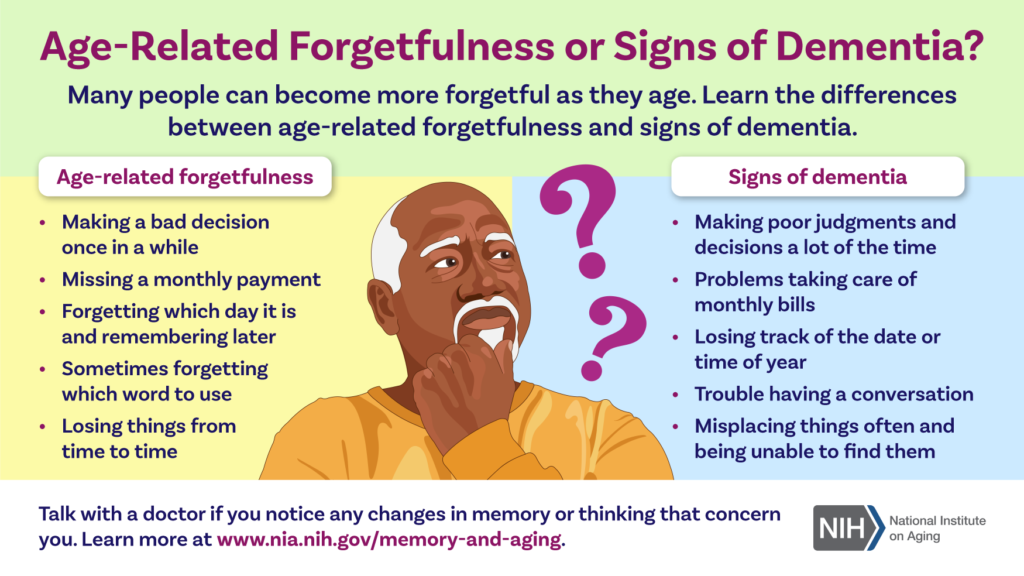Aging is a natural process that brings many changes in one’s life. As we age, our bodies and minds change, and this can be quite an overwhelming process, both for the aging individual and their caregivers. Today, our blog post will delve into the fourth and final M of the Age-Friendly framework, mentation. We will explore the three Ds of mentation- Delirium, Depression, and Dementia- and their impact on aging adults. Our goal is to provide insight into what they are, their causes, screening tools, and how to support aging adults who suffer from these conditions.
Delirium, Depression, and Dementia are all common conditions that affect aging adults. Delirium is a medical condition characterized by confusion, disorientation, and acute changes in cognitive function. It is often caused by dehydration, infections, surgery, pain, or medications. Some high-risk medications that can cause changes in mentation include antipsychotics, benzodiazepines, and opioids. See our blog post from last week on M-Medications for a deeper dive into “high risk” medications for aging adults. It is crucial to screen aging adults for delirium during hospitalization, as this condition can last for days or weeks and can worsen significantly. We see this often in patients in the hospital.
Let’s jump in.

Delirium:
Delirium is a medical condition that affects a person’s ability to think, communicate, and pay attention. It is often caused by medical conditions or medication, and people with delirium may have trouble recognizing people or situations. The key to preventing delirium is identifying the underlying cause, and this requires a thorough assessment of the individual. Some of the common causes of delirium in aging adults include infections, dehydration, urinary tract infections, and medications such as strong painkillers. Even the post op phase of surgery can cause some of these symptoms. Reducing the use of high-risk medications and ensuring proper hydration are some of the ways to reduce the risk of delirium in aging adults.
Delirium is a sudden change in an individual’s mental state that can last anywhere from a few hours to a few days or weeks. It can be a medical emergency and require immediate attention. Aging adults are at a higher risk of developing delirium during hospitalization. Simple steps such as providing adequate hydration, nutrition, and avoiding unnecessary medications can help reduce the risk of delirium episodes in aging adults.
Something as simple as a urinary tract infection can cause an aging adult to have delirium, episodes of confusion and other cognitive symptoms. Delirium in some cases can also be called “Sun downing” this is a term used to describe confusion and behavior changes that occur most often around bedtime and during the night. Most often this can occur when someone is taken out of their familiar environment and place somewhere they are unfamiliar with, such as a hospital. It could also occur while traveling or visiting family members, especially with aging adults that may also have some dementia symptoms.

Depression:
Depression is not a normal part of aging, but it is common among older adults. It can often be mistaken for grief, and one of the surest signs of depression is prolonged sadness, hopelessness, or feelings of worthlessness. Aging adults who frequently show a lack of interest in hobbies they previously enjoyed or isolate themselves from friends and family may also be showing signs of depression. Screening for depression is critical, as it is often underreported in aging adults. A healthcare provider can assess the condition and provide treatment options such as medication, therapy, lifestyle changes or a combination of all three.
Aging adults may experience depression due to factors such as chronic illnesses, social isolation, and loss of loved ones. Symptoms of depression can be confused with normal aging changes, which makes it difficult to detect.
Depression is another common condition that affects aging adults. It is different from grief and can significantly impact an individual’s daily function and quality of life. The symptoms of depression can vary, and aging adults may not always show the traditional signs such as sadness and agitation. Instead, they may exhibit symptoms such as fatigue, changes to their sleep patterns, loss of appetite, difficulty concentrating, and memory problems. It is essential to identify signs of depression in aging adults early on, as timely treatment can prevent severe health consequences.

Dementia:
Dementia is a brain disorder that affects memory, thinking, and communication. Alzheimer’s Disease is the most common form of dementia in aging adults, and its prevalence increases with age. One of the crucial steps in managing dementia is early identification. Early signs of dementia include difficulties in completing familiar tasks, loss of initiative and motivation, and problems with memory. A healthcare professional can determine the stage of dementia and suggest ways to support the aging adult, such as memory aids, a consistent routine, stimulating activities, and medication.
Dementia is a progressive cognitive decline that affects aging adults. It is common for aging adults to experience lapses in cognition, but there is a difference between normal forgetfulness and dementia. One of the most significant differences is that forgetfulness does not interfere with daily activities, while dementia does. It is essential to screen aging adults for dementia using standardized screening tools such as the Montreal Cognitive Assessment (MoCA) and the Mini-Mental State Examination (MMSE). Early intervention and treatment can help slow the progression of the disease. Everyone should start getting screened at their annual wellness or Medicare exam beginning with the milestone of turning 65. The sooner concerns are identified the better the treatment plan.

Dementia is an umbrella term used to describe a decline in cognitive function, including memory, thinking, and reasoning. Alzheimer’s disease is the most common type of dementia, but there are other types such as vascular dementia, frontotemporal dementia, or Lewy Body dementia. The symptoms of dementia vary and may include memory loss, difficulty performing familiar tasks, and changes in personality and behavior. Normal forgetfulness in aging adults, such as forgetting where they placed their keys, does not necessarily indicate dementia. Regular cognitive screening, including memory tests, can help detect dementia early. Unfortunately, there is no cure for dementia, but it can be managed through medication, therapy, and lifestyle changes. See our graphic from the National Institute on Aging that shows some normal signs of aging forgetfulness vs dementia.
High-risk medications:
Some medications can impact an individual’s ability to think, communicate, or pay attention. Medications such as sedatives and strong painkillers are often responsible for inducing delirium in aging adults. A healthcare provider can screen high-risk medications and replace them with safer alternatives when necessary.
The risk of developing the three D’s can be reduced by following a few tips such as drinking plenty of water, exercising, eating a healthy diet, and getting enough rest. Caregivers should also ensure that their aging loved ones are taking medications safely and have regular check-ups with their doctors.
Certain medications can increase the risk of delirium, depression, and dementia in aging adults. These medications include benzodiazepines, anticonvulsants, and antipsychotics. Regular medication review is essential in identifying and managing medications that may have a negative impact on mentation. Good communication between healthcare providers and aging adults is essential in ensuring that medications are being taken appropriately. For more information on high-risk medications that can have an impact on the cognition of our aging loved ones, see our blog post from last week in the resource sections or you can click HERE.

By WavebreakMediaMicro Adobe Stock Photos
Conclusion:
As we age, our mental health becomes incredibly important to our overall well-being. The Age-Friendly Framework highlights Mentation, which is the fourth and final M in the framework. Delirium, depression, and dementia all impact aging adults, and recognizing the signs and symptoms is critical to manage these conditions effectively. Screening for high-risk medication and early identification of medical conditions is crucial in reducing the risk of developing these conditions and improving the quality of life for aging adults.
In conclusion, the fourth M of the Age-Friendly framework is significant in the lives of aging adults. Delirium, Depression, and Dementia can play a profound role in how aging adults function daily, impacting their quality of life. Therefore, it is crucial to understand the causes, screening tools, and how to support aging adults who suffer from these conditions. Identifying the signs of these conditions early can have significant positive impacts on our loved ones’ health and well-being. By following healthy lifestyle tips, we can reduce the risk of developing these conditions and, where possible, manage them effectively. Let’s remember that aging adults are a vital part of our society, and we must do our part in ensuring they age with grace and dignity.
As a society, we need to take a more invested role in the care and treatment of aging adults, especially when it comes to mentation. By doing so, we can help aging adults maintain their mental health and enjoy a high quality of life.
Thanks for stopping by and spending some time with us here on the blog. We welcome all comments and questions! We hope you find value and don’t hesitate to let us know what topics are of importance to know more about.
Take care and see you back here soon,
Pam and Linda
Your Nurse Advocates
“Compassionate care for aging adults and peace of mind for adult children.”
Resources:
Blog Post: 4 Ms. Medication-High Risk Medications.
Your Nurse Advocate Consulting Website
Join our Free Forum on Speaking out on the Care of Your Aging Parents
https://www.agefriendlycare.psu.edu/the-4ms-explained
https://www.ihi.org/Engage/Initiatives/Age-Friendly-Health-Systems/Pages/default.aspx
https://www.johnahartford.org/grants-strategy/current-strategies/age-friendly/age-friendly-care





